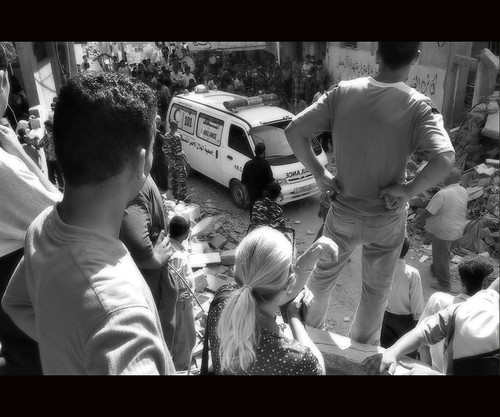Tab dump 16-11-09 (though really not so much a tab dump as three-four blog posts in one)
First off, Andrew Corsello's blistering and sublimely, viciously angry takedown of Ayn Rand. It is at least ten thousand characters too long, and not so much an article as a 26.000 character rant, but it is readable, funny, immensely satisfying and it makes a good point when it connects the dots between Randian uncritical thinking and the clusterfuck of the global economy. Highlights include this wonderfully obtuse letter to the editor from Alan Greenspan, literary critic and bigtime randroid, on the occasion of Atlas Shrugged being panned in a review.
Corsello comments:To the editor:
"Atlas Shrugged" is a celebration of life and happiness. Justice is unrelenting. Creative individuals and undeviating purpose and rationality achieve joy and fulfillment. Parasites who persistently avoid either purpose or reason perish as they should.
Alan Greenspan
I recently made an offhand remark about how Rand had a way of reaching nice, likeable, intelligen but maybe involuntarily celibate young men and turning them into horrible people. Morsello really captures this process. And the article ends, orgasmically, with this outburst:It's a remarkable letter for two reasons. The first, of course, is that Greenspan wrote it; a line can be drawn from that letter to the wholesale deregulation of the American economy, to the invention of hydra-headed derivatives and credit-default swaps, and finally to the collapse of the financial and housing markets.
In the very last paragraph, you learn why the author is so angry. It's a nice payoff.Fuck you, Ayn Rand.
Fuck you for turning some of the most open and interesting people I ever met into utopian dickheads.
Fuck you for injecting them with a sneering sense of superiority, and with the tautological belief that anyone who didn't "get it" was a jealous know-nothing—which, ipso facto, only proved that superiority.
A fabulous interview with climatologist Stephen Schneider on climate skepticism. He also makes some really well-argued points along the way about both the injustice of the climate problem, and more importantly the entire scientific process itself. How it works, and why the climate skeptics are arguing in bad faith.
Read the whole thing.You talk about subjectivity, but isn’t science supposed to be objective?
No. Science is truthful, which doesn’t necessarily mean objective. How can science be objective about the future? How much data do we have for 2100? Try zero. We have data for 2009 and previous years. We take that data, analyze where we think it’s high quality, analyze where we’re not so sure of the quality, show how well the data explains multiple phenomena from the past, and ask how closely related those phenomena are to the future.
(...)
Once we build our climate models, we must always make a subjective judgment, because it is going to be a prediction outside the realm of direct verifiability. We have to be able to predict whether this is a potential catastrophe for humanity. We can’t just hang around and wait.
In your book, you suggest a kind of continuum: from objective data to subjective determinations based on the data, and then to value judgments.
Right. What to do about what we know--that’s a question of values. But it’s values informed by science. In 1973, I got a call from the Council on Foreign Relations wanting me to talk about policy. I told them that if we’re using the atmosphere as a free sewer to dump our tailpipe wastes, and it’s going to cause change that could harm agriculture, ecosystems, ice sheets, and sea level, then maybe a smart move would be to slow down the rate at which we pollute. That’s a value judgment, and I’ve been making them from the beginning. I’m a very risk-averse person and I worry much more about the planetary life support system than the bottom line of the coal industry.
How then do you defend against charges that you’re an activist?
I am an activist. I want the world to be a better place, and I define specifically what I mean by that: If one group, the rich, benefits from an activity like dumping their waste in the atmosphere and the other group, the poor, are hurt by it and don’t get much benefit, that’s an inequity. Therefore, in my value system, that’s a higher criteria for action than aggregate dollars. I don’t have aggregate dollars as my moral principle. I look at who’s responsible. But I never say that without admitting that those are my values. So, that’s activism.
What’s the difference between being a climate-change skeptic and a denier?
Every good scientist is a skeptic. In fact, I would argue that every good citizen is a skeptic. We have to learn to discern, and listen to the quality and logic of an argument.
For the Norwegians:
Bergens Tidende har flere interessante artikler i dag om gatevold og unge frustrerte menn som er verdt å lese. Ikke minst fordi den tar opp spørsmålet om integrering og sosial kapital – for første gang på lenge ikke som et etnisk/kulturelt spørsmål, men som et sosialt spørsmål, som vi kan behandle, avgrense og møte med sosiale, politiske, økonomiske og pedagogiske virkemidler. Ikke som noe abstrakt, fremmed og fjernt. Denne serien med artikler er noe av det mest tankevekkende jeg har lest om norsk integrering på flere uker, og innvandring nevnes ikke med et ord (bortsett fra når det er snakk om innvandringsfiendtlige miljøer).
Labels: ayn rand, blind vold, climate change, climate skeptics, innvandring, integrering, objectivism, philosophy, science, sosial kapital


